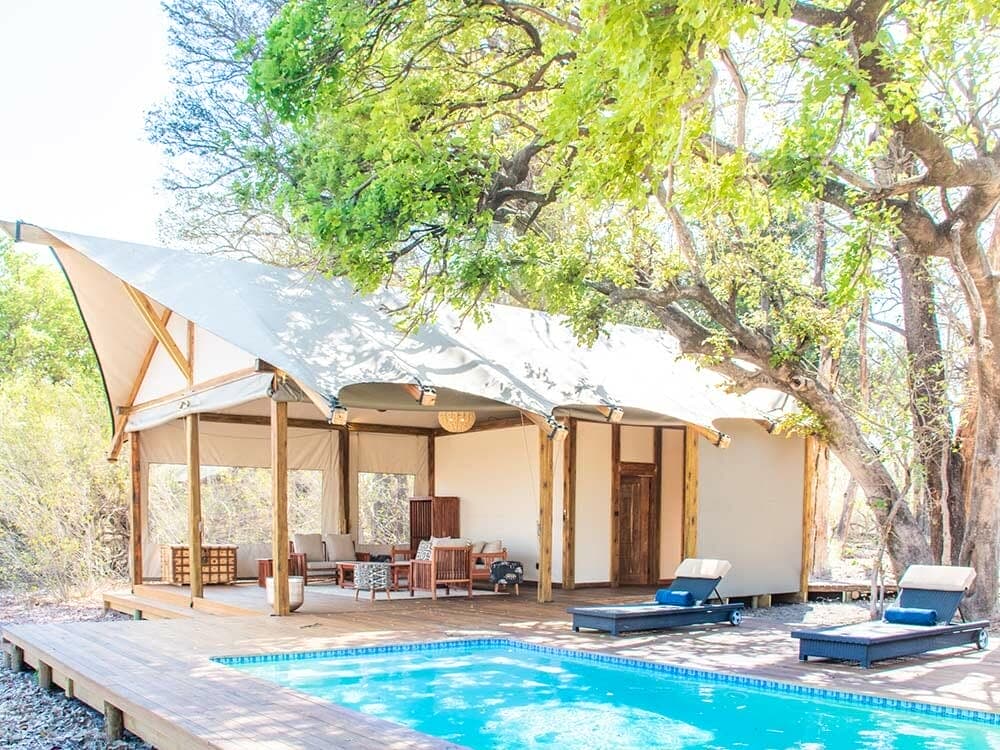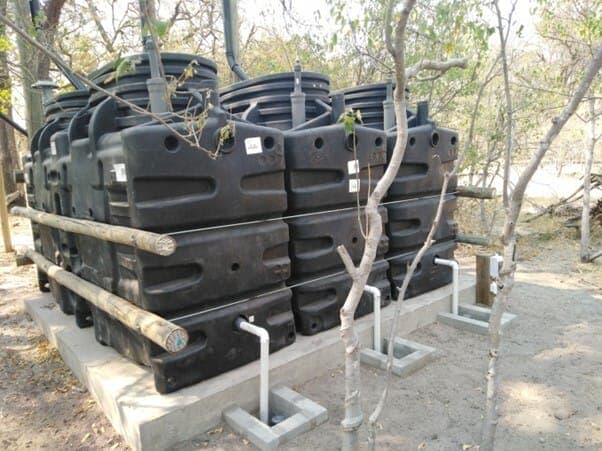Kwara Camp, a remote safari camp in the heart of the Okavango Delta in Botswana provides visitors access to both the waterways and expansive dryland areas of the Delta. Moreover, the camp offers incredible opportunities to see a significant number of endangered species including lions, cheetahs, elephants, giraffes, zebras, and regular wild dogs. Visitors to Kwara can explore the Delta on game drives, mokoro trips, and fishing trips.
The diversity of wildlife has led the Okavango Delta to be recognized as a World Heritage Site.
 The camp was substantially rebuilt and refurbished in 2019 and relies entirely on solar energy. It comprises nine canvas tents, each with a spacious deck overlooking the lagoon, an ensuite bathroom with both indoor and outdoor showers, and a bath.
The camp was substantially rebuilt and refurbished in 2019 and relies entirely on solar energy. It comprises nine canvas tents, each with a spacious deck overlooking the lagoon, an ensuite bathroom with both indoor and outdoor showers, and a bath.
At the center of the camp is a central building with a dining area, lounge, and curio shop. Kwara also has two small pool areas at each end of the camp providing guests with more private lounge areas. In the end, the camp accommodates up to 18 guests with 35 staff members living on-site.
Working in this sensitive environment presents major challenges as there is no mains electricity supply, all power is generated through a solar system. Camp operators are unable to construct any permanent buildings or structures due to regulations around the protection of this World Heritage Site. This created some significant challenges for the development and installation of a sewerage system for Kwara Camp.
Based in Maun, Northwest Botswana, The Solar Zone specializes in the design, supply including installation of a variety of energy-efficient and environmentally friendly technologies. Their main goal is to provide affordable energy for homes, offices, and safari camps located in the area, and contribute to the improvement and development of rural communities. Their wastewater division is an accredited BIOROCK dealer, trained to professionally install and maintain the BIOROCK range of wastewater treatment plants.
The MULTIROCK solution, comprising of ECOROCK-5000 units installed in parallel, presented the ideal solution for Kwara Camp. The ECOROCK system uses a combination of anaerobic and aerobic processes to provide complete treatment of domestic sewage (wastewater). What sets ECOROCK apart is that it does not require electricity, unlike other sewage treatment technologies, making it the preferred choice for rural applications where the only energy source is from solar or generators. Furthermore, the excellent treated water quality can be discharged directly into the local receiving environment, subject to site-specific environmental regulations.
 To minimize the impact and footprint of the installation, the Kwara Camp MULTIROCK system was installed above-ground, so that it may be removed with minimal impact, and moved to a new site if required, thereby extending the useful service life of the equipment.
To minimize the impact and footprint of the installation, the Kwara Camp MULTIROCK system was installed above-ground, so that it may be removed with minimal impact, and moved to a new site if required, thereby extending the useful service life of the equipment.
As a final stage, the treated effluent is disinfected to remove harmful bacteria, using an inline chlorination system rather than an ozonation or UV system which again requires electricity. The simplicity and reliability of the chlorine system ensure both consistent results and site-appropriate maintenance.
The BIOROCK solution supplied at Kwara camp has proven highly successful, with the MULTROCK yielding a simple, robust, and zero-electricity wastewater treatment solution for the camp. Not only is this a great result for the Kwara Camp operation and the local receiving environment, but also for The Solar Zone, who prefer BIOROCK due to its simplicity, leading warranties, and high-quality final effluent.